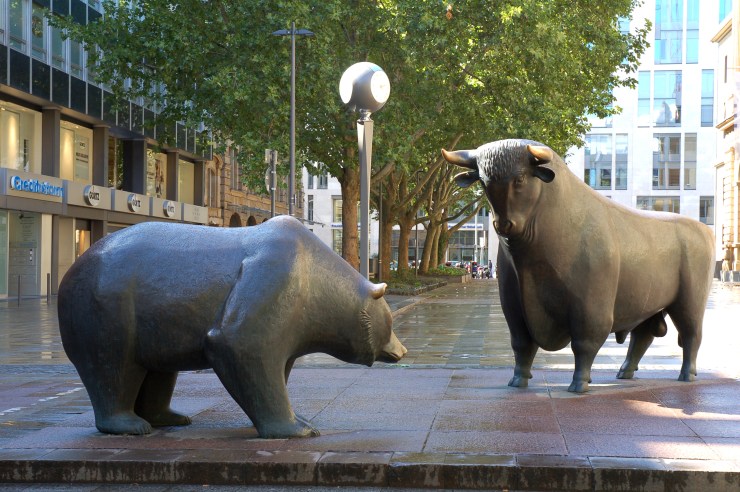What To Do About Stock Market Meltdown? How About Nothing?
By I&I Editorial
IssuesInsights.com

No doubt about it, it’s a bad time to be fully invested in the stock market. Prognosticators abound, yet no one really knows what the stock market will do next. What’s happening, and what should you do?
First, let’s recap Monday’s market mayhem.
Before the market even opened, stock futures for S&P 500 index flashed a huge 7% decline. That triggered so-called “circuit breakers,” rules that require trading to be suspended 15 minutes to prevent a panicked rush for the exits. That’s always a bad sign.
Equally bad, the Dow Jones Industrial Average tanked more than 2,000 points, off 7.8% at day’s close, while the growth-stock rich Nasdaq Index plunged more than 7.3%.
Why has the stock market suddenly gone so sour, after hitting record highs repeatedly early in the year? The one word reply is: fear. More specifically, fear of the unknowable, fear of what comes next.
The Covid-19 virus’ spread is the main unknown, sending waves of panic through global markets. The World Health Organization says there are now some 110,000 Covid-19 cases worldwide, with an estimated 3,809 deaths.
Another fear relates to the shocking collapse in oil prices and interest rates, usually signs of impending deflation and declines in future investment across the economy. Monday’s near-21% plunge in oil prices was the biggest since the financial crisis, while the 10-year Treasury rate hovers around 0.5%, not far above zero.
Still another fearful unknown is the stunning success of socialist ideas — embodied by wealth-grabber and nationalizer Bernie Sanders, but by other candidates, too — in recent Democratic primaries. Is it possible that so many Americans could be deceived by the fool’s gold of socialism? Scary, but it sure looks that way.
All of the above, by the way, contributed to the market’s meltdown.
Contrary to popular opinion among some academics, stocks do not move randomly. The stock market’s price system gauges millions of investors’ guesses for what the economy will look like in six to 12 months. Then it adjusts prices accordingly. Investors make a probabilistic assessment, and change it every day.
What the market is recognizing right now is a massive rise in uncertainty about the strength of the global economy and corporate earnings in the near future. So stock prices take the hit.
“In this volatile environment, there is a flurry of activity with traders moving in and out of positions to capture profits and limit losses,” Rick Swope, a senior director at E*Trade, told the Street.com.
Exactly correct.
Prices Adjust To Reality. That’s Why They Work.
So what’s the proper response by government to all of this? Bailouts? More market controls? Negative interest rates?
The correct answer is: Nothing. Stocks have benefited from a decade-long bull market, one that was due for a correction. With so much recent uncertainty, investors sold off some of their gains.
Despite rampant coronavirus fears fed to us by our incompetent national media, government doesn’t need to intervene further in the markets. Prices will find their level, and adjust to reality. That’s why they work.
Yes, many private investors have taken big hits. It’s always a risk. But none of those investors, we would bet, were asking for upside “circuit breakers” as their stocks rose from dizzying high to dizzying high late last year and early this year.
Recall that it was the Fed’s March 3 “emergency” 50-basis-point rate cut to prevent a recession that set off a major market sell-off. While well-intended, the Fed’s message sent to uncertain investors was very much the same as that infamous line in the movie “The Fly”: “Be afraid. Be very afraid.”
Immediately after that Fed cut, frightened investors raced for the door. Now, further government interventions through federal spending “stimulus,” new controls on financial markets, or more panicked interest-rate cuts will only confuse investors and create greater fear.
Why? By muddying the signals sent by market prices, regulatory intervention in the financial markets makes it impossible for investors to make clear decisions. The result is more uncertainty, not less.
By leaving markets alone, prices will adjust more quickly. And when things materially improve, they will snap back more quickly, as well.
Before the markets opened on Monday, economist Art Laffer, former adviser to President Ronald Reagan and the man many consider to be the godfather of supply-side economics, had this sage advice to those worrying about the stock market:
“When people make decisions when they’re panicked or drunk, the consequences are rarely attractive,” he told Fox Business Network anchor Stuart Varney. “This is what I’m worried about now: That the government will try to do something rash. It’s times like these that free markets are the single most important thing you can do.”
Laffer should know. His advice to Reagan during the 1987 market crash — when the Dow plunged 23% in a day — was summed up by the joke, “don’t just stand there, undo something.”
What he meant then, and now, is government should try to ease rules that interfere with financial market prices and keep businesses and entrepreneurs from innovating and creating — and avoid phony feel-good Keynesian stimulus plans that do nothing but transfer more money from the private sector to the government. If we do anything, he said, we should declare a tax holiday for a few months or longer, in effect a tax cut. Give taxpayers their own money back. That’s not government spending or big new social programs or crony capitalism or more regulation. It’s letting people keep what they already earned. Good idea. We agree.
This is hard for people accustomed to government “doing something” every time things go badly. But, as the great economist Ludwig von Mises long ago argued, “Depressions and mass unemployment are not caused by the free market but by government interference in the economy.”
Free markets work far better at fixing things than government intervention. That includes the stock market.

